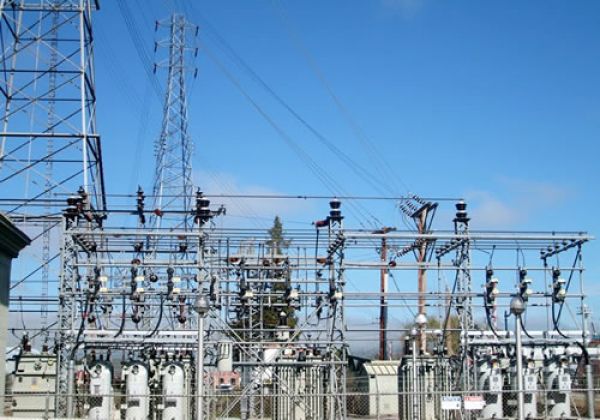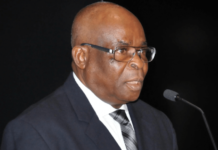 |
| •A power plant |

Nigeria plans to start building a $5.8 billion
hydro-power plant in the Mambila region this year after it agrees on
loan terms with China’s Export-Import Bank.
hydro-power plant in the Mambila region this year after it agrees on
loan terms with China’s Export-Import Bank.
“We hope to break ground this year if we can conclude the financing,”
Power, Works and Housing Minister Babatunde Fashola said in a January
23 interview in Abuja.
Power, Works and Housing Minister Babatunde Fashola said in a January
23 interview in Abuja.
“Contracts are in place. We are good to go.”
Fashola told reporters in August that the Chinese lender would
finance 85 percent of the cost, and the Federal Government the rest.
China Civil Engineering Corporation will build the 3,050-megawatt power
plant over five years, and the facility will include four dams measuring
50 meters (164 feet) to 150 meters high, and 700 kilometers (435 miles)
of transmission lines, he said.
finance 85 percent of the cost, and the Federal Government the rest.
China Civil Engineering Corporation will build the 3,050-megawatt power
plant over five years, and the facility will include four dams measuring
50 meters (164 feet) to 150 meters high, and 700 kilometers (435 miles)
of transmission lines, he said.
(adsbygoogle = window.adsbygoogle || []).push({});
Nigeria, which has 180 million people living with daily power cuts,
is seeking to expand electricity generation to drive growth after the
economy contracted in 2016 for the first time in 25 years.
is seeking to expand electricity generation to drive growth after the
economy contracted in 2016 for the first time in 25 years.
Fashola,
former Governor of Lagos State, the nation’s bustling commercial hub,
was appointed in 2015 by President Muhammadu Buhari to take charge of
the troubled power sector.
former Governor of Lagos State, the nation’s bustling commercial hub,
was appointed in 2015 by President Muhammadu Buhari to take charge of
the troubled power sector.
The government expects power-production capacity to increase to 8,600
megawatts in a year from 7,000 megawatts currently, Fashola said in the
interview. In comparison, South Africa, with a third of Nigeria’s
population, has an electricity-generating capacity of more than 40,000
megawatts.
megawatts in a year from 7,000 megawatts currently, Fashola said in the
interview. In comparison, South Africa, with a third of Nigeria’s
population, has an electricity-generating capacity of more than 40,000
megawatts.
Transformers with a combined capacity of 1,400 megawatts will be
deployed across the country this month to further boost electricity
supply, state-owned Transmission Company of Nigeria says on its website.
Transmission capacity currently stands at about 7,000 megawatts.
deployed across the country this month to further boost electricity
supply, state-owned Transmission Company of Nigeria says on its website.
Transmission capacity currently stands at about 7,000 megawatts.
Distribution capacity
Nigeria also plans to improve distribution capacity, currently at
about 5,000 megawatts. Since the country is able to produce more
electricity than it can distribute, some production capacity will remain
idle until the government expands the network.
about 5,000 megawatts. Since the country is able to produce more
electricity than it can distribute, some production capacity will remain
idle until the government expands the network.
(adsbygoogle = window.adsbygoogle || []).push({});
The government is looking to partner with private companies to invest
in mini-grid projects and generate an additional 3,000 megawatts of
electricity over five years, Fashola said. Investors are showing
interest, he said, without further details.
in mini-grid projects and generate an additional 3,000 megawatts of
electricity over five years, Fashola said. Investors are showing
interest, he said, without further details.
A number of planned solar power projects have failed to secure
funding and should be reassessed, according to the Minister. The Nigeria
Bulk Electricity Trading Plc signed preliminary power-purchase
agreements in 2016 with private companies for 14 solar projects meant to
generate 1,125 megawatts of electricity, but there have been issues
over payment-related guarantees, Fashola said.
funding and should be reassessed, according to the Minister. The Nigeria
Bulk Electricity Trading Plc signed preliminary power-purchase
agreements in 2016 with private companies for 14 solar projects meant to
generate 1,125 megawatts of electricity, but there have been issues
over payment-related guarantees, Fashola said.
These should be redesigned to sell electricity not only to the
government via the national grid but to customers in remote areas
directly, according to the Minister.
government via the national grid but to customers in remote areas
directly, according to the Minister.
“They should rethink their models and begin to look at estates and communities,” he said.
The government is also working on regulations to license suppliers of
electricity meters to stop some distribution companies from billing
arbitrarily, Fashola said. “We want to open the meter market because the
core business of a distributor is not metering but distribution of
energy.” (Bloomberg)
electricity meters to stop some distribution companies from billing
arbitrarily, Fashola said. “We want to open the meter market because the
core business of a distributor is not metering but distribution of
energy.” (Bloomberg)










